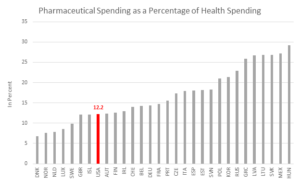For the 30 nations that comprise the Organization for Economic Cooperation and Development (OECD), which promotes policies to improve the well-being of people around the world, pharmaceutical spending comprised, on average, 16.9 percent of total health care spending as of 2015.
The OECD defines pharmaceutical spending as the expenditures on prescription medicines that are sold over-the-counter. Therefore, the medicines administered in hospitals are excluded from these numbers.
Given this figure, and based on the news coverage, if you had to guess what percentage of total health care spending pharmaceuticals comprise in the U.S., it would not be unreasonable to guess that it is higher than 16.9 percent. After all, according to Senators Sanders and Warren, importing drugs from Canada is a near-panacea that will solve the health care cost problems in the U.S.
If you guessed that U.S. spending is above average, then you would be wrong. According to the OECD, total pharmaceutical spending in the U.S. comprises 12.2 percent of total health care spending. In fact, the U.S. has the 8th lowest spending percentage of all the OECD countries (see the chart below).

Of course, there could be many reasons why the U.S. spending is so low. Perhaps, it is because overall health care spending is higher. This is, of course, the point.
As I wrote in a recent Pacific Research Institute study, “U.S. Pharmaceutical Pricing in Context,” higher U.S. prescription drug prices are not driving up health care costs overall.
High drug prices, just like high MRI prices and high hospital prices are all symptoms of the fundamental problems that plague the U.S. health care system. Improving the quality of health care while also driving down its costs requires policymakers to focus on the root causes of these problems, not the symptoms. These root causes are the adverse incentives and anti-competitive regulations that thwart innovation and increase medical costs.
Improving health care in the U.S. must start with eliminating these disincentives.
Wayne Winegarden, Ph.D. is a Senior Fellow in Business and Economics at the Pacific Research Institute and Managing Editor for EconoSTATS.
